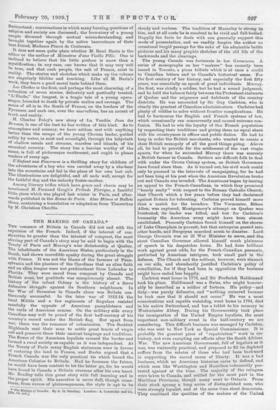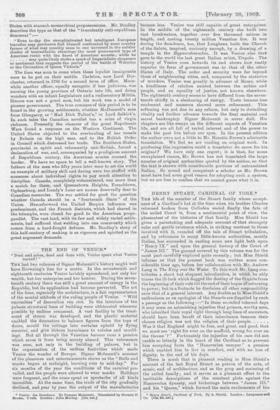THE MAKING OF CANADA.*
Tan romance of Britain in Canada did not end with the expulsion of the French. Indeed, if the interest of con- struction be greater than the interest of conquest, the most stirring part of Canada's story may be said to begin with the Treaty of Paris and Murray's wise dictatorship at Quebec. The inhabitants of the American States, particularly in the South, had shown incredible apathy during the great struggle with France. It was not the blame of the farmers of Penn- sylvania and the planters of the Carolinas that an alien faith and an alien tongue were not predominant from Labrador to Florida. They were saved from conquest by Canada and British inane, but gratitude was conspicuously absent. The history of • the infant Colony is the history of a fierce defensive - struggle against its Southern neighbours. In the War of Secession in Canada alone was Britain con- tinuously successful. In the later war of 1812-14 the local Militia and a few regiments of Regulars resisted manfully the appeals of American pamphleteers and the raids of American armies. On the military side every Canadian may well be proud of the first half-century of his country's record under the British flag. But apart from war, there was the romance of colonisation. The Scottish Highlands sent their sons to settle great tracts of virgin soil and preserve there their ancient language and traditions. The flower of the American loyalists crossed the border and formed a rural society as capable as it was independent. At the Treaty of Paris many English statesmen were in favour of restoring the land to France, and Burke argued that a French Canada was the only practical tie which bound the American Colonies to Britain. Had he foreseen the future, be would-have been content to let the latter go, for he would have found in Canada a Britain overseas after his own heart. Mr. Bradley tells this great story with full learning and in the proper spirit. His narrative is never dull, though some- times, from excess of picturesqueness, the style is apt to be • The Making of Canada, By A. 0. Bradley. London A. Constable and Co. Gd. net.]
cloudy and verbose. The tradition of Macaulay is strong in him, and at all costs he is resolved to be vivid and full-bodied. Happily the facts he deals with can generally support this mode of presentation, and we readily forgive the author an occasional turgid passage for the sake of his admirable battle pictures and his many graphic sketches of the old life of the backwoods and the clearings.
The young Canada was fortunate in her Governors. A series of monographs on her "makers" has recently been issued in Toronto, a pious tribute which is at once a credit to Canadian letters and to Canada's historical sense. For the first century of her history, and especially the first fifty years, was essentially an epoch of great individuals. Murray, the first, was chiefly a soldier, but he had a sound judgment, and he held the balance fairly between the Protestant stalwarts of Quebec and the seigneurs and habitants of the country districts. He was succeeded by Sir Guy Carleton, who is clearly the greatest of Canadian administrators. Carleton had plenty of riddles to solve without frontier complications. Ho had to harmonise the English and French systems of law, which occasionally ran concurrently and caused extreme con- fusion. He had to win the loyalty of the Frenoh population by respecting their traditions and giving them an equal share with his countrymen in offices and public duties. He had to keep in order the British merohants, who wanted to create a close British monopoly of all the good things going. Above all, he had to provide for the settlement of the vast virgin spaces, for when he succeeded Murray there was scarcely a British farmer in Canada. Settlers are difficult folk to deal with under the Crown Colony system, as British Governors have found since then. As it turned out, his civil work could only be pursued in the intervals of campaigning, for ho had not been long at his post when the American Revolution broke out and Canada was invaded. The Americans began by issuing an appeal to the French-Canadians, in which they promised "hearty amity" with respect to the Roman Catholic Church, that Church which a few years before they had deolaimed against Britain for tolerating. Carleton proved himself more than a match for the invaders. The Vermonter, Ethan Allen, was captured, Montgomery's attempt on Quebec was frustrated, its leader was killed, and but for Carleton's humanity the American army might have been almost annihilated. Presently Carleton found himself on the shores of Lake Champlain in pursuit, but that enterprise passed into other hands, and Burgoyne marched south to disaster. Lord George Germain was an ill War Minister to serve, and the stout Canadian Governor allowed himself much plainness of speech in his despatches home. He had done brilliant work against great odds, for the French-Canadian peasants, perturbed by American intrigues, took small part in the' defence. The Church and the noblesse, however, were staunch on our side, and abundantly justified Carleton's policy of conciliation, for if they had been in opposition the business might have ended less happily.
Carleton went home in 1778, and Sir Frederick Haldimand took his place. Haldimand was a Swiss, who might honour- ably be described as a soldier of fortune. His policy—and duty—was purely defensive, and "nothing occurred because he took care that it should not occur." He was a most conscientious and capable watchdog, went home in 1784, died in hie native Switzerland, and has a tablet to his memory in Westminster Abbey. During his Governorship took place the immigration of the United Empire loyalists, the most important non-military event in the half-century we are considering. This difficult business was managed by Carleton, who was sent to New York as Special Commissioner. It is probably the greatest piece of "repatriation" work in our history, not even excepting our efforts after the South African War. The new American Government, full of legalists as it was, was eminently practical, and proposed to fill its depleted coffers from the estates of those who had been backward
in supporting the sacred cause of liberty. It was a bad business, which no American historian cares to defend, and
which men like Washington and Hamilton vehemently pro- tested against at the time. The majority of the refugees were taken to Canada, and settled for the most part in the Maritime Provinces, though many went to Ontario. From their stock sprang a long series of distinguished men, who were strongly loyalist, and at the same time stout democrats. They combined the qualities of the makers of the United States with staunch monarchical prepossessions. Mr. Bradley describes the type as that of the "truculently anti-republican democrat " "Even to-day the unsophisticated but intelligent European traveller may perchance find himself confronted by some country farmer of what may possibly seem to one unversed in the subtler shades of transatlantic ethnology the most pronounced typo of American rustic with the finest of American accents ; while he may quite likely strike a spark of Imperialistic eloquence or sentiment that suggests the period of the battle of Waterloo or the Coronation of Queen Victoria."
The time was soon to come when these loyalist immigrants were to be put on their mettle. Carleton, now Lord Dor- chester, returned in 1786 for a second term of office. Mean- while another officer, equally energetic if less judicious, was nursing the young province of Ontario into life, and doing wonders with an infant Legislature and a rudimentary Militia. Simcoe was not a great man, but his work was a model of pioneer government. The true romance of this period is to be found in the growing settlements, whether McDonnell's men from Glengarry, or "Mad Dick Talbot's," or Lord Selkirk's. In such tales the Canadian novelist has a mine of virgin richness. Presently the clamour of the great Napoleonic Wars found a response on the Western Continent. The United States objected to the overhauling of her vessels by Britain on the high seas, and to the British Order in Council which distressed her trade. The Southern States, provincial in spirit and vehemently anti-British, forced a declaration of war, and, accompanied by a prodigious amount of Republican oratory, the American armies crossed the border. We have no space to tell a well-known story. The fathers 'of the men who fifty years later were to set the world an example of military skill and daring were too stuffed with nonsense about individual rights to pay much attention to discipline. Canada, completely outnumbered, was more than a match for them, and Queenstown Heights, Frenclitown, Ogdensburg, and Lundy's Lane are names deservedly dear to Canadian memories. The war settled for good the question
whether Canada should be a "fourteenth State" of the Union. Henceforward the United Empire influence was
predominant, and the French districts, which had shared in the triumphs, were closed for good to the American propa- gandist. The vast land, with its few and widely varied settle- ments, had suffered that welding into one community which comes from a hard-fought defence. Mr. Bradley's story of this half-century of making is as vigorous and spirited as the great argument demands.











































 Previous page
Previous page